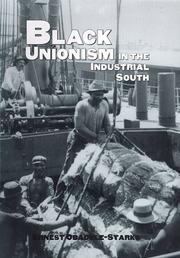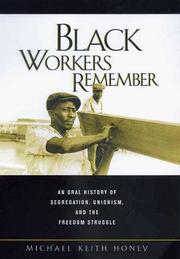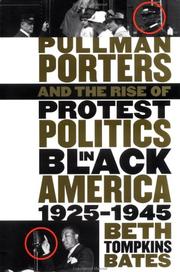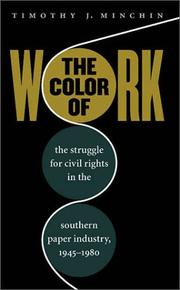| Listing 1 - 7 of 7 |
Sort by
|

ISBN: 0807862878 9780807862872 0807823775 0807846783 9780807823774 9780807846780 9798890868961 Year: 1998 Publisher: [Place of publication not identified] University of North Carolina Press
Abstract | Keywords | Export | Availability | Bookmark
 Loading...
Loading...Choose an application
- Reference Manager
- EndNote
- RefWorks (Direct export to RefWorks)
Coal miners --- African American coal miners --- African American labor union members --- Business & Economics --- Labor & Workers' Economics --- African American members of labor unions --- Afro-American labor union members --- Labor union members, African American --- Labor unions --- Labor union members --- Afro-American coal miners --- Coal miners, African American --- Colliers (Coal miners) --- Miners --- History --- African American membership

ISBN: 0585378177 9780585378176 0890969124 9780890969120 9781585441679 1585441678 Year: 2000 Volume: no. 11 Publisher: College Station : Texas A&M University Press,
Abstract | Keywords | Export | Availability | Bookmark
 Loading...
Loading...Choose an application
- Reference Manager
- EndNote
- RefWorks (Direct export to RefWorks)
"Black Unionism in the Industrial South presents the struggles of black workers who fought for equality and unionization in the heyday of Gulf Coast industry. Ernest Obadele-Starks examines the workers' responses to racial and class domination and their creative strategies to reach their goals. Facing public and corporate policies that typically deferred to white workers, blacks banded together to achieve representation in the workplace, form union auxiliaries, charter their own local unions, seal alliances with members of the black middle class, and manipulate the media to benefit their cause."--Jacket. "Obadele-Starks eloquently captures these workers' fight and discusses the implications of their struggle on the industrial society of the Upper Texas Gulf Coast today. Students and scholars of American labor history, race relations, and Texas history will find Black Unionism in the Industrial South a valuable scholarly work."--Jacket.
African American labor union members --- Race discrimination --- Equality --- Egalitarianism --- Inequality --- Social equality --- Social inequality --- Political science --- Sociology --- Democracy --- Liberty --- Bias, Racial --- Discrimination, Racial --- Race bias --- Racial bias --- Racial discrimination --- Discrimination --- African American members of labor unions --- Afro-American labor union members --- Labor union members, African American --- Labor unions --- Labor union members --- History --- African American membership --- Southern States --- Economic conditions. --- E-books
Book

ISBN: 0801446589 0801461952 9780801461958 9780801446580 9780801474316 0801474310 Year: 2011 Publisher: Ithaca, NY
Abstract | Keywords | Export | Availability | Bookmark
 Loading...
Loading...Choose an application
- Reference Manager
- EndNote
- RefWorks (Direct export to RefWorks)
Black Power at Work chronicles the history of direct action campaigns to open up the construction industry to black workers in the 1960's and 1970's. The book's case studies of local movements in Brooklyn, Newark, the Bay Area, Detroit, Chicago, and Seattle show how struggles against racism in the construction industry shaped the emergence of Black Power politics outside the U.S. South. In the process, "community control" of the construction industry-especially government War on Poverty and post-rebellion urban reconstruction projects- became central to community organizing for black economic self-determination and political autonomy. The history of Black Power's community organizing tradition shines a light on more recent debates about job training and placement for unemployed, underemployed, and underrepresented workers. Politicians responded to Black Power protests at federal construction projects by creating modern affirmative action and minority set-aside programs in the late 1960's and early 1970's, but these programs relied on "voluntary" compliance by contractors and unions, government enforcement was inadequate, and they were not connected to jobs programs. Forty years later, the struggle to have construction jobs serve as a pathway out of poverty for inner city residents remains an unfinished part of the struggle for racial justice and labor union reform in the United States.
Civil rights movements --- Black power --- Labor movement --- Affirmative action programs --- Construction workers --- African American labor union members. --- African American construction workers. --- Labor unions --- Afro-American construction workers --- Construction workers, African American --- African American members of labor unions --- Afro-American labor union members --- Labor union members, African American --- Labor union members --- Construction industry --- Labor and laboring classes --- Social movements --- African Americans --- African American membership --- Employees --- Civil rights --- Economic conditions --- African American construction workers --- African American labor union members --- E-books

ISBN: 0520928067 058527634X 9780520928060 9780585276342 0520217748 9780520217744 Year: 1999 Publisher: Berkeley, Calif. University of California Press
Abstract | Keywords | Export | Availability | Bookmark
 Loading...
Loading...Choose an application
- Reference Manager
- EndNote
- RefWorks (Direct export to RefWorks)
"The labor of black workers has been crucial to economic development in the United States. Yet because of racism and segregation, their contribution remains largely unknown. This work tells the hidden history of African American workers in their own words from the 1930s to the present. It provides first-hand accounts of the experiences of black southerners living under segregation in Memphis, Tennessee, the place where Martin Luther King, Jr., was assassinated during a strike by black sanitation workers. Eloquent and personal, these oral histories comprise a unique primary source and provide a new way of understanding the black labor experience during the industrial era. Together, the stories demonstrate how black workers resisted apartheid in American industry and underscore the active role of black working people in history."--Jacket.
African Americans --- Labor movement --- African American labor union members --- Race discrimination --- Afro-Americans --- Trade-unions --- Black Americans --- Colored people (United States) --- Negroes --- Africans --- Ethnology --- Blacks --- Bias, Racial --- Discrimination, Racial --- Race bias --- Racial bias --- Racial discrimination --- Discrimination --- Labor and laboring classes --- Social movements --- African American members of labor unions --- Afro-American labor union members --- Labor union members, African American --- Labor unions --- Labor union members --- Employment --- History --- Social conditions. --- History. --- Afro-American membership --- African American membership --- United States --- Race relations. --- Race question --- Black people

ISBN: 0807875368 9780807875360 0807826146 9780807826140 0807849294 9780807849293 9798890871602 Year: 2001 Publisher: Chapel Hill ; London : The University of North Carolina Press,
Abstract | Keywords | Export | Availability | Bookmark
 Loading...
Loading...Choose an application
- Reference Manager
- EndNote
- RefWorks (Direct export to RefWorks)
Focusing on the struggle of the Brotherhood of Sleeping Car Porters (BSCP), to form a union in Chicago (HQ of the Pullman Company), this work charts the quest of African Americans for civil rights in the inter-war period. New ground was broken by backing up demands with collective action.
Pullman porters --- African American labor union members --- Discrimination in employment --- Race discrimination --- Bias, Job --- Employment discrimination --- Equal employment opportunity --- Equal opportunity in employment --- Fair employment practice --- Job bias --- Job discrimination --- Race discrimination in employment --- Employment (Economic theory) --- Affirmative action programs --- African American members of labor unions --- Afro-American labor union members --- Labor union members, African American --- Labor unions --- Labor union members --- Porters, Pullman --- Train attendants --- History. --- Political activity --- African American membership

ISBN: 0807849332 0807826189 0807875481 9798890872494 Year: 2001 Publisher: Chapel Hill : University of North Carolina Press,
Abstract | Keywords | Export | Availability | Bookmark
 Loading...
Loading...Choose an application
- Reference Manager
- EndNote
- RefWorks (Direct export to RefWorks)
Histories of the civil rights movement have generally overlooked the battle to integrate the South's major industries. The paper industry, which has played an important role in the southern economy since the 1930's, has been particularly neglected. Using previously untapped legal records and oral history interviews, Timothy Minchin provides the first in-depth account of the struggle to integrate southern paper mills. Minchin describes how jobs in the southern paper industry were strictly segregated prior to the 1960's, with black workers confined to low-paying, menial positions. All work
Discrimination in employment --- Paper industry workers --- Race discrimination --- African American labor union members --- African American members of labor unions --- Afro-American labor union members --- Labor union members, African American --- Labor unions --- Labor union members --- Bias, Racial --- Discrimination, Racial --- Race bias --- Racial bias --- Racial discrimination --- Discrimination --- Paper industry --- Paper mill workers --- Paper workers --- Paperworkers --- Employees --- Bias, Job --- Employment discrimination --- Equal employment opportunity --- Equal opportunity in employment --- Fair employment practice --- Job bias --- Job discrimination --- Race discrimination in employment --- Employment (Economic theory) --- History --- African American membership --- African-American labor union members --- E-books --- Affirmative action programs
Book
ISBN: 1283901684 0252094506 9780252094507 0252037324 9780252037320 9781283901680 Year: 2013 Publisher: Urbana
Abstract | Keywords | Export | Availability | Bookmark
 Loading...
Loading...Choose an application
- Reference Manager
- EndNote
- RefWorks (Direct export to RefWorks)
Lisa Phillips presents a distinctive study of District 65 and its efforts to secure economic equality for minority workers in sales and processing jobs in small, low-end shops and warehouses throughout the city. Phillips shows how organizers fought tirelessly to achieve better hours and higher wages for unskilled, unrepresented workers and to re-value their work, the result of an economy inclining toward fewer manufacturing jobs and more low wage service and processing jobs.
Labor unions --- African American labor union members --- African Americans --- Minorities --- Discrimination in employment --- Bias, Job --- Employment discrimination --- Equal employment opportunity --- Equal opportunity in employment --- Fair employment practice --- Job bias --- Job discrimination --- Race discrimination in employment --- Ethnic minorities --- Foreign population --- Minority groups --- Afro-Americans --- Black Americans --- Colored people (United States) --- Negroes --- African American members of labor unions --- Afro-American labor union members --- Labor union members, African American --- Industrial unions --- Labor, Organized --- Labor organizations --- Organized labor --- Trade-unions --- Unions, Labor --- Unions, Trade --- Working-men's associations --- History --- Employment --- African American membership --- Employment (Economic theory) --- Persons --- Assimilation (Sociology) --- Discrimination --- Ethnic relations --- Majorities --- Plebiscite --- Race relations --- Segregation --- Africans --- Ethnology --- Blacks --- Labor union members --- Labor movement --- Societies --- Central labor councils --- Guilds --- Syndicalism --- E-books --- Affirmative action programs --- Black people
| Listing 1 - 7 of 7 |
Sort by
|

 Search
Search Feedback
Feedback About UniCat
About UniCat  Help
Help News
News